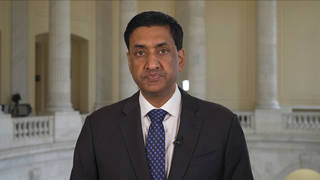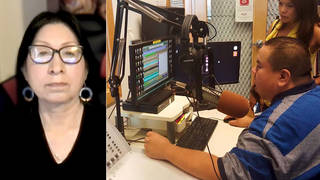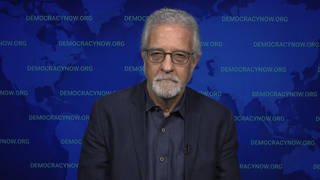
Guests
- Nana Gyamficriminal defense and human rights attorney and the executive director of the Black Alliance for Just Immigration.
The Biden administration is granting more than 100,000 Haitians in the United States the chance to gain temporary protected status, or TPS, which includes work permits and protection from deportation while Haiti suffers a political crisis. Haitian President Jovenel Moïse continues to refuse calls to step down, even as human rights groups report he has sanctioned attacks against civilians in impoverished neighborhoods in Port-au-Prince, with targeted assassinations and threats against government critics carried out with impunity. President Joe Biden deported more Haitians during his first two months than Donald Trump did in the last year of his presidency. “It’s a break for people who have been looking over their shoulders, who have been worried and concerned about what happens if they’re not given this relief and either become undocumented or detained and deported back to Haiti,” says Nana Gyamfi, executive director of the Black Alliance for Just Immigration. “It’s a break, but that’s all it is. It’s a break, and we obviously want more.”
Transcript
AMY GOODMAN: This is Democracy Now! I’m Amy Goodman.
We end today’s show looking at the Biden administration’s move to extend TPS — that’s temporary protected status — to more than 100,000 Haitians in the United States for the next 18 months. The new order applies to any Haitian who’s currently living in the U.S.
The Biden administration had been facing increasing criticism for deporting more Haitians during the first two months than Donald Trump did in the last year of his presidency, even though Homeland Security officials privately acknowledge that deported Haitian immigrants, quote, “may face harm upon return to Haiti.”
Haitians first received protected status following the 2010 earthquake. Haiti is now facing a major political crisis. The Haitian president, Jovenel Moïse, has refused calls to step down, even as human rights groups report he’s sanctioned attacks against civilians in poor neighborhoods of Port-au-Prince, with targeted assassinations and threats against government critics carried out with impunity.
We’re joined now by Nana Gyamfi. She is executive director of the Black Alliance for Just Immigration, which has been a lead organization in the push for TPS for Haiti.
This came out over the weekend, Nana. The significance of TPS for 100,000 Haitians?
NANA GYAMFI: Thank you, Amy, for having me.
It really is significant. It is, in terms of a reprieve. It’s relief. It’s a break for people who have been looking over their shoulders, who have been worried and concerned about what happens if they’re not given this relief and either become undocumented or detained and deported back to Haiti. So it’s a break. But that’s all it is, is a break. And we obviously want more.
AMY GOODMAN: So, talk about how you organized for this.
NANA GYAMFI: So, clearly, it wasn’t just BAJI. There are other organizations that were involved, including organizations that are led by Haitians, focused on Haitians, with the Haitian community, as well as other Black-led organizations and other immigrant rights and civil rights organizations. This has been a long push to make sure that Haitians are able to at least have the opportunity to apply for TPS.
And it’s been on so many levels. There’s been lawsuits that have been filed, after Donald Trump ended temporary protective status for certain countries at the end of 2017 and the beginning of 2018, including Haiti, as well as efforts that have been made through grassroots organizing, efforts that have been made through pushing policymakers, and particularly, when the Biden administration came to power, there have been efforts from every corner and area pushing to make sure that Haitians were able to get this opportunity for temporary protective status. It’s way overdue. Like, this was a no-brainer. And it’s something that should have been done in the first week of the Biden administration coming into power. But we’re glad that it finally has happened.
AMY GOODMAN: And explain exactly what it means for Haitians living here.
NANA GYAMFI: So, it doesn’t automatically mean that you have temporary protected status. And I think that’s important to say, because the way that it’s being described in the media often is, Haitians are getting temporary protective status. And it’s not quite that.
It’s an opportunity. There’s an application process that you have to go through. The application process includes biometrics, etc. There are fees that go with that. And then there’s a background check, which we’ll talk about later, which prevents — just those things, so many folks who could get temporary status, who are eligible, you know, prevent them from getting it.
But for those who able to go through those hoops and hurdles, if you are able to get TPS, then you are able to work here. You get a work authorization. And you are protected, most importantly, from detention and deportation.
AMY GOODMAN: So, can TPS be made permanent? I mean, some people have been living here for over a decade.
NANA GYAMFI: TPS can be made permanent, but not through the administration. Congress has the power to have folks who are right now protected by temporary protected status become permanent residents, become citizens, give some kind of pathway to permanent protections. And that’s what, for example, the Dream and Promise Act, SECURE Act purports to do.
The problem that we have as BAJI is that there are criminal bars, criminal exclusions, that prevent certain people with criminal histories from being able to get that protective status. When you look at who’s being detained and deported from Haiti — not expelled from the border, but actually from the interior — over 80% of Haitians that are deported are deported on criminal grounds — not because Haitians commit more crimes than anyone else, but for the same reasons that we see the disproportionate impact of criminalization on African Americans. We’re immigrants, but we’re Black people, as Black immigrants. And Haitians are Black people and are going to deal with the same criminal sanctions and criminal bars that you find in the African American community.
And so, again, even though this is helpful and it gives people this opportunity, the opportunity does not mean that you have the permanent protection. However, the administration, though it can’t grant permanent protection, it has the option to not enforce. Right now it talks about enforcement priorities. And what we’re saying is, flip the frame and talk about prioritizing protections. Just as they do for cannabis — you know, they’re not going after Big Cannabis, even though that’s against the law, allegedly, in federal law — they also can decide that they’re not going to enforce with respect to immigrants. And in the case specifically of Haitians, that we’re talking about now, they can make the decision to prioritize protection for Haitians, and other Black migrants and other migrants in this country.
AMY GOODMAN: What other nationalities do you think should be getting TPS, temporary protected status, now, Nana?
NANA GYAMFI: Well, the ones that don’t have it right now that we think should be getting TPS include Cameroon, which, as you know and you’ve reported on, Amy, is in the middle of basically a civil war; Mauritania, where you have enslavement happening right now in the ways that it has happened continuously, really, for hundreds of years now; Saint Vincent —
AMY GOODMAN: We have 10 seconds.
NANA GYAMFI: — and Grenadines — sorry — Bahamas, Guinea, Sierra Leone are also countries that we believe should be getting TPS.
AMY GOODMAN: And do you believe that Black immigrants are cracked down harder at the border?
NANA GYAMFI: Absolutely. When you look at the expulsions, it’s clear. As you pointed out in your opening, more Haitians have been expelled under the Biden administration. But it’s not just Haitians. It is people from all over the continent of Africa, as well as the Caribbean.
AMY GOODMAN: Nana Gyamfi, we want to thank you so much for being with us, executive director of the Black Alliance for Just Immigration, an issue we will certainly continue to cover. I’m Amy Goodman. Thanks for joining us.













Media Options